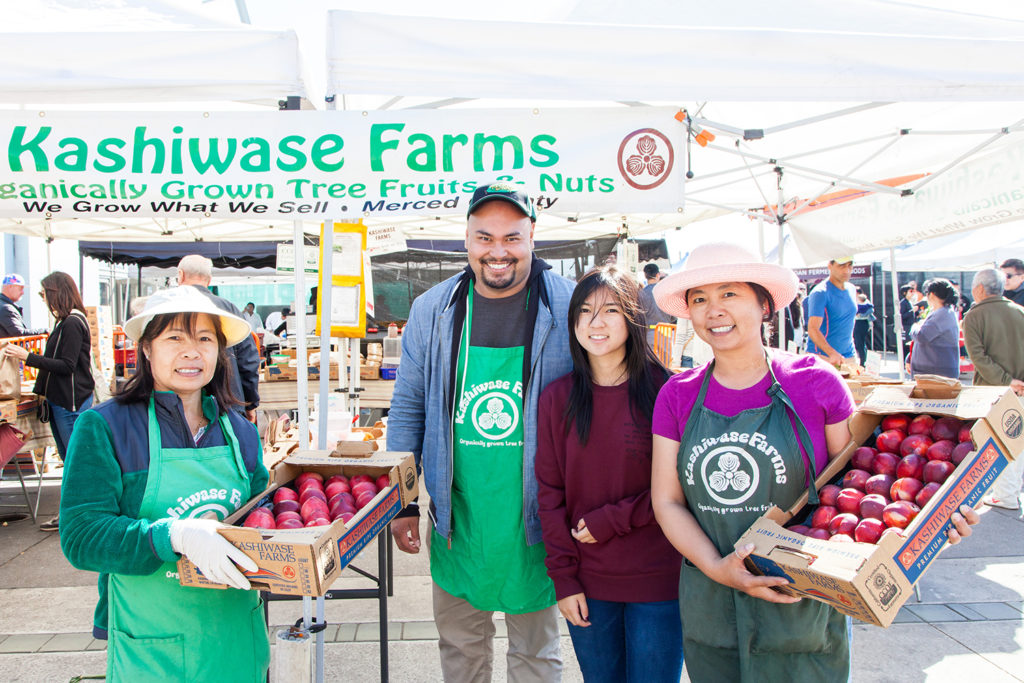Kashiwase Farms Ripens Stone Fruit to Perfection
Savannah Kuang, CUESA Staff
May 31, 2019

Stone fruit season has officially begun at the farmers market, which means the much-anticipated return of Kashiwase Farms, with varieties such as Coral Champagne cherries and Poppy apricots, as well as hybrid fruits such as pluots and apriums.
A crowd favorite for more than 20 years, Kashiwase Farms brings organic stone fruit and almonds from their Winton farm to the Ferry Plaza Farmers Market every Saturday from late spring to early fall. Third-generation farmer Steven Kashiwase and his wife, Lisa, cultivate the farm’s legacy ecologically and financially as they plan for the next generation.
Farming in the Yamato Colony

Steven’s grandfather, Frank, started a 20-acre vineyard in the Central Valley in the 1920s after moving from San Francisco to Yamato Colony, a Japanese farming community that was about two miles outside the town of Livingston. Frank came to the colony with a group of Japanese Americans who wanted to farm together, and that community later became the Livingston Farmers Association. Residents of the Yamato Colony focused on agriculture and never established grocery stores, laundries, or other businesses, in an attempt to avoid anti-Japanese racist hostilities.
After World War II, Steven’s father, Henry, also started farming and purchased some land in Cressey, where he grew peaches and almonds conventionally until he died in an accident in the 1970s. During the time of his father’s passing, Steven had just graduated from University of California, Davis, where he studied pomology and entomology, the sciences of fruit and insects respectively.
“I was considering getting into farming at the time, but I also didn’t have any real plans,” says Steven. “But farming was in the back of my mind because of what I studied in college. Since my dad passed, I started farming in order to help my mother out.”
From Conventional to Organic

Continuing his father’s legacy, Steven farmed conventionally until the mid-1980s. “When I started doing farmers markets, customers were asking for organic produce,” says Steven. “So I thought it would be a good idea to start switching over to organic, and I became certified in the late 1990s in order to meet their demand. Plus, I was getting really tired of using pesticides, and my employees were also tired of it. So I felt that it was the best time for us to convert.”
Steven diversified the orchards and started planting different varieties such as Asian pears, nectarines, and other stone fruit. He converted the entire farm to organic in the 1990s and was certified by California Certified Organic Farmers (CCOF) in 1997. The farm now grows about 180 varieties of nuts and fruits, which ripen at different times throughout the season, on 190 acres.
Growing organically and harvesting fruit at peak ripeness is labor and cost intensive, but the Kashiwases have made it sustainable by selling at farmers markets. “Selling my crops at CUESA allows me to sell directly to the consumers at a price that supports my farm financially to the next year,” he says.
Weathering Uncertainty
The heavy rains this season have made stone fruit and almond harvests much more challenging and hard to predict this year. “The weather has been more variable than ever before,” says Steven. “There’s no set date for any variety to start ripening because it depends heavily on the weather.”
“Usually, the rain stops in April, but it’s already the month of May, and the rain has continued,” says Lisa, who can usually be found at the farmers market on Saturdays. “Our crops have been ruined and it’s been harder to harvest. For example, if you look at the skin of a peach, you’ll see how delicate it is. So, if water touches it, it will spoil and rot.”
Even with this weather gamble, Steven is trying to remain optimistic about this year’s rain, as it helps to replenish the orchards’ water table. “We had a drought for about four to five years, but we didn’t have to deal with copious amounts of water,” says Steven. “But at the same time, it was hard to farm without water, so I’d rather have the water to be able to sustain my crops either way.”
Holding Hope for the Next Generation
Steven and Lisa are uncertain about what the future will hold for their farm, as their children decide whether to follow their footsteps. “My kids are in college right now, so I’m leaving it open for them to decide if that’s what they want,” says Steven. “I am getting up there in age though, so hopefully they make up their minds more quickly.”
Steven also hopes to see more young farmers in the future. “There’s not enough younger farmers, so I’m hoping that the next generation will look more into organic farming because it’s becoming more mainstream than it used to be,” he says. “The future looks good as far as straying away from conventional agriculture to more sustainable farming.”

Find Kashiwase Farms at the Ferry Plaza Farmers Market on Saturdays.
Photos of Kashiwase Farms farmers market stand courtesy of Amanda Lynn Photography.
